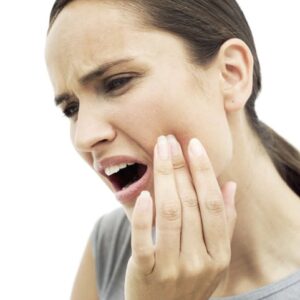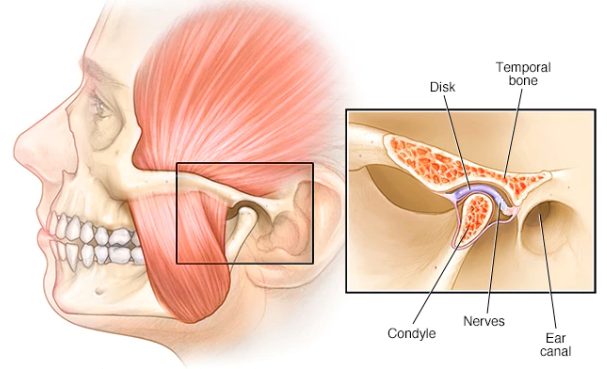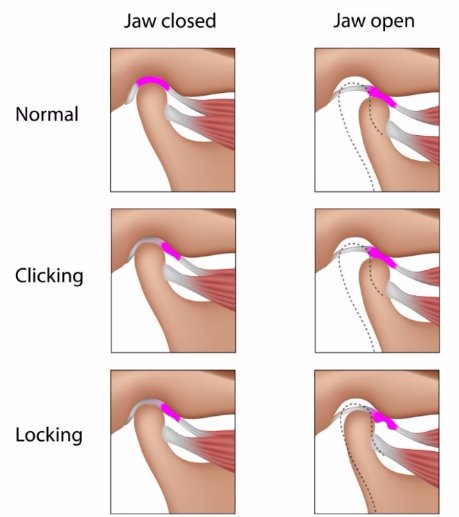
Dr. Seo is extremely knowledgeable and I am very happy he is helping me control my neck pain and headaches. Prior to seeing him I had seen numerous doctors trying to find an answer for my pain. I was constantly told that there was nothing wrong and nothing to be done, except to take more pain meds. Dr. Seo treats the whole body, not just symptoms. He is educating me on how to control my symptoms at home with exercises and stretches. He answers all of my questions and takes pride in helping me understand spine anatomy and the associated nerves.
Tara R.
Why Does Your Jaw CLICK or POP?

Clicking or popping in the jaw is one of most common symptoms of Temporal Mandibular Joint (TMJ) Disorder. This is a condition that can cause clenching, pain, and clicking in the jaw and muscles that control the jaw movement. An estimated 75% of the U.S. population has experienced one or more signs of TMJ Disorder. Most TMJ Disorder symptoms are temporary, but 10% of the population will require professional treatment. The condition appears to be more common in women than men. TMJ Disorders involve more than a single symptom and involve multiple cause. The pain may arise suddenly or progress over a period of months to years with intermittent frequency and intensity. The most successful and scientifically supported treatment consists of conservative therapy, which shows that over 50% of TMJ Disorder patients have few or no symptoms.
TMJ is an orthopedic joint that connects the mandible (lower jawbone) to the temporal bone of the skull in the front of the ear. The disc cushions the load between the two bones while the jaw opens. Any problem that prevents this complex system of muscles, ligaments, discs and bones from working properly will result in painful TMJ disorder. TMJ Disorder includes the jaw joint, muscles, tendons, ligaments, and nerves.

TMJ Mechanics
The TMJ is a “loose-fitting”, rotating and sliding joint with a fibro-cartilage covered, football shaped ball (condyle), fibrous pad (disc), fibro-cartilage lined socket (fossa), ligaments, tendons, blood vessels, and nerves. The fibrous pad/disc functions as a moving shock absorber and stabilizer between the condyle and fossa. As the jaw opens, the condyle rotates and slides forward with the disc.
Muscles of mastication (jaw muscles) connect the mandible (lower jaw) to the maxillae (upper jaw), skull, and neck. These muscles open close, protrude, and move the jaw side to side, enabling you to talk, chew, and swallow. The supporting muscles of mastication consist of neck and shoulder muscles and these muscles stabilize the skull on the neck during jaw function.

Normal TMJ Movement
In a normal TMJ movement, the disc is between the condyle (jaw joint) and the temporal bone. It provides cushion and allows the condyle to glide along the temporal bone. Without this cushion, the two bones will wear each other down causing degeneration of the bones and pain. As the jaw opens, the disc stays between the condyle and temporal bone.
TMJ Clicking or Popping
A jaw that pops or clicks when opening and/or closing, is an indication of a TMJ disorder. When the upper and lower teeth are together, the disc is not between the jaw joint. This may cause ringing, stuffiness or fullness of the ears, earaches, temple pain, and/or facial pain. TMJ pain can also occur with clicking or popping, but many times pain is not experienced.
TMJ Locking
Lockjaw or Closed Lock is the termed used for a TMJ disorder in which the disc is not between the jaw joint and the disc does not slip back onto the jaw joint when opening the mouth. Opening of the mouth is limited by half of normal range.
The upper & lower teeth are together and the disc is off the jaw joint (condyle). This may cause ringing, stuffiness or fullness of the ears, earaches, temple pain and/or facial pain. TMJ pain is experienced by many people when a TMJ disorder advances to this stage. The disc can be placed back onto the jaw joint, especially if treated early after onset. If treatment is not done, degeneration of the TMJ may occur causing more pain and dental problems.
Advanced stage of TMJ Disorder
TMJ disorders can progress to degeneration of the joint and surrounding tissues. Bone, ligaments and disc deterioration can occur if TMJ disorders are left untreated. In worse cases, surgery is warranted.
Self Treatments for TMJ Clicking
Some home treatments for jaw clicking and popping include the following:
- Rest the muscles and joints by eating soft food and limit talking. Avoid chewing gum.
- Limit jaw opening by cutting food into smaller pieces and stifling yawing.
- Relax the jaw by keeping the mouth slightly open by leaving a space between the teeth.
- Reducing stress can relax the muscles of mastication to decrease teeth grinding. Meditation, exercises and deep breating may be beneficial for some people.
- Heat and/or ice packs on the jaw may help to calm inflammation in the TMJ
- Keep good posture when you sit in front of your workstation. Avoid reading in bed.
Summary
In most cases, TMJ clicking and popping is temporary. However, if you are experiencing jaw popping that persists, worsens, recurs, or is accompanied by pain or if the jaw is locked, it is important to address the underlying cause of jaw popping to prevent other complications from arising. If you are currently suffering from symptoms listed above and want help immediately, fill out the form below. We serve patients from Bryn Mawr, Radnor, Havertown, Ardmore, Wynnewood, Philadelphia and surrounding areas.

